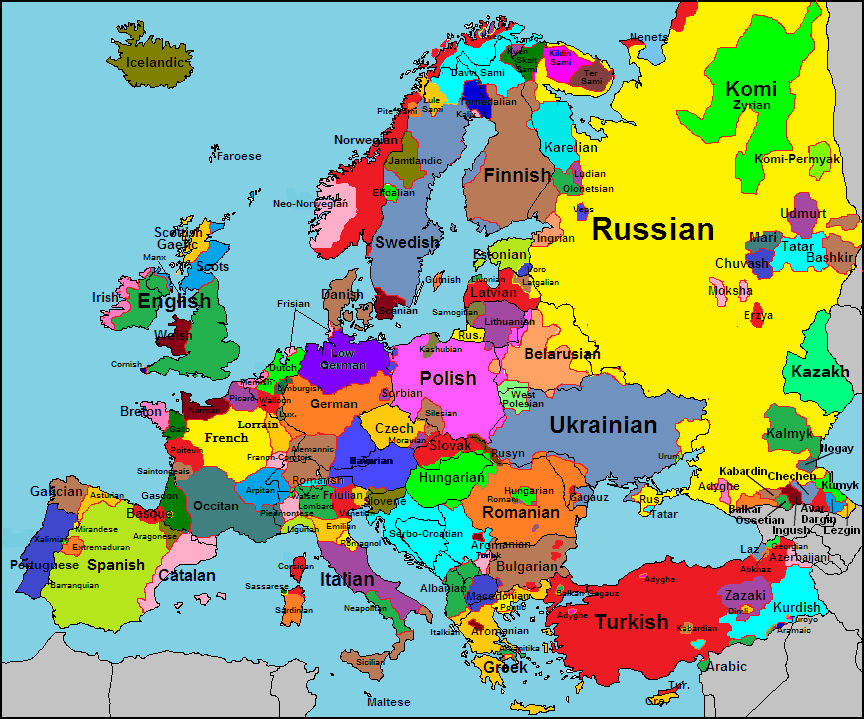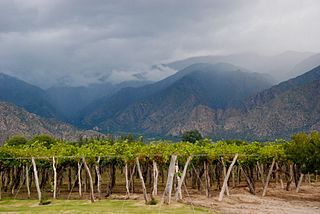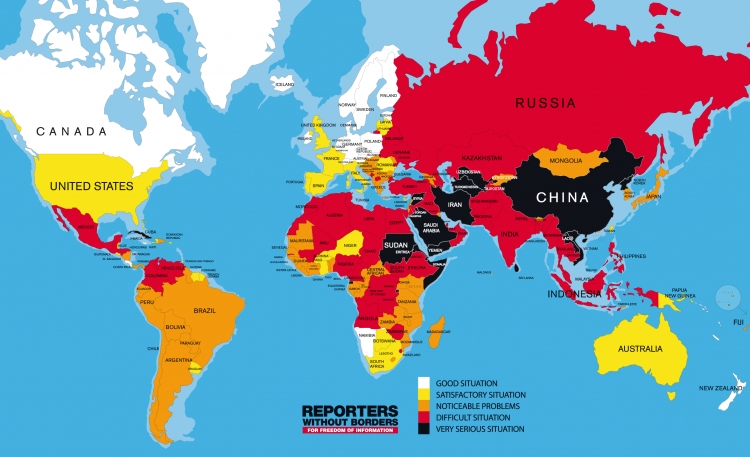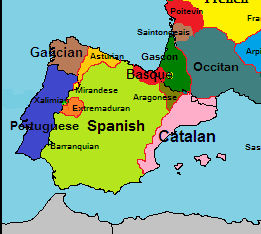 On October 1st, the Catalonian region of Spain held a referendum similar to “Brexit” on whether they should leave Spain or not. But unlike with Brexit and the vote in Scotland the results weren’t even close. In the vote in Scotland to split from England, the vote was close but narrowly voted to stay while in Brexit England narrowly voted to leave the EU. In addition, prior to the Scottish vote, Britain had given permission for the vote to occur, in effect opening the door (or legitimizing) the possibility of Scottish secession. This was not the case in Catalonia where the Spanish Parliament is rabidly opposed to secession.
On October 1st, the Catalonian region of Spain held a referendum similar to “Brexit” on whether they should leave Spain or not. But unlike with Brexit and the vote in Scotland the results weren’t even close. In the vote in Scotland to split from England, the vote was close but narrowly voted to stay while in Brexit England narrowly voted to leave the EU. In addition, prior to the Scottish vote, Britain had given permission for the vote to occur, in effect opening the door (or legitimizing) the possibility of Scottish secession. This was not the case in Catalonia where the Spanish Parliament is rabidly opposed to secession.
The Catalonian referendum question, which voters answered with “Yes” or “No”, was “Do you want Catalonia to become an independent state in the form of a republic?”. In Catalonia, the “Yes” side won, with 2,044,038 (92.01%) voting for independence and 177,547 (7.99%) voting against, on a turnout of 43.03%. In other words the result was overwhelmingly for leaving Spain.
Catalonia is the richest region of Spain, is bigger than Greece and represents 20% of the Spanish economy and so naturally the politicians in Madrid are reluctant to see their cash cow dry up. Thus they are strongly resisting any effort by the Catalonians to leave Spain. To that effect they actually had their national police use violence in an attempt to prevent peaceful crowds of citizens from voting. This did not go over well with the people and this “heavy-handed approach” may have actually had the opposite effect than intended and changed the results from “No” to “Yes”. Had they simply let the people vote and then declared the results illegal and made tax concessions as they did for the Basques recently the whole problem may have melted away. But that is not what they chose to do. Martin D. Weiss thinks it could end in a Spanish Civil war.
Why Secede?
One might wonder why one section of Spain would want to leave anyway. But the idea of Spain as we know it is a mere fiction made up of various ethnic groups that were either conquered or acquired through the marriage of feuding Monarchies. In the following map you can see that European ethnicities have nothing to do with the national boundaries drawn up by politicians. Catalonians have their own unique language and culture, entirely separate from Spain. (As do the Basques and the small group of Aragonese).
Madrid Moves to Stop Independence
In response to the vote for independence the Senate (Parliament) in Madrid voted to take the “heavy handed” approach and invoked a previously unused Article 155 in the 1978 Spanish Constitution sometimes called “the Nuclear Option”. Basically asserting that Catalonia’s vote for independence was actually a “Revolution” and it needed strong Government intervention to quell it. Article 155 is only 2 paragraphs long and states that if a regional government “doesn’t comply with the obligations of the Constitution or other laws it imposes, or acts in a way that seriously undermines the interests of Spain” the article can be invoked via an absolute majority vote. If approved the national government may adopt the “necessary methods” to force a regional government to comply in order to protect “said interests”. In other words, Madrid is willing to play rough if those pesky Catalonians don’t stay in line. According to the Washington Post, “There were also reports that Spanish prosecutors were preparing to file rebellion charges against Catalan President Carles Puigdemont… and… the central government could move swiftly to remove the Catalan regional president, suspend his ministers and assume authority over the region’s public media, police and finances. “
E.U. and U.S. State Department Responses
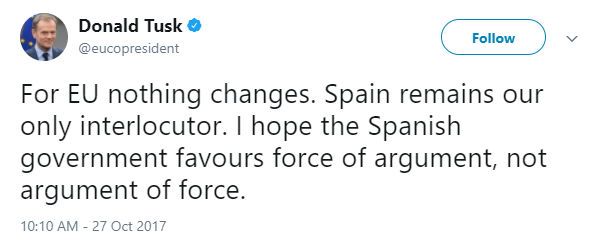 In order for Catalonia’s independence to move forward it is probably necessary for it to get other countries to recognize it as an independent country, which may be difficult as all of its neighbors are joint members of the European Union and the EU may not be too happy with a split within its ranks. Immediately after the vote for independence, Donald Tusk, President of the European Council tweeted: “For EU nothing changes. Spain remains our only interlocutor. I hope the Spanish government favours force of argument, not argument of force.” An obvious appeal for calm heads without violence. However, as we said in Brexit: Britain Defies the Odds and Chooses Independence, independence rarely comes without bloodshed (with Brexit being the possible rare exception) if it actually happens (Parliament still has to work out the details).
In order for Catalonia’s independence to move forward it is probably necessary for it to get other countries to recognize it as an independent country, which may be difficult as all of its neighbors are joint members of the European Union and the EU may not be too happy with a split within its ranks. Immediately after the vote for independence, Donald Tusk, President of the European Council tweeted: “For EU nothing changes. Spain remains our only interlocutor. I hope the Spanish government favours force of argument, not argument of force.” An obvious appeal for calm heads without violence. However, as we said in Brexit: Britain Defies the Odds and Chooses Independence, independence rarely comes without bloodshed (with Brexit being the possible rare exception) if it actually happens (Parliament still has to work out the details).
Apparently the U.S. State Department believes that Citizens are the property of the State and that people don’t actually have a right to vote for independence. In a telling response to the almost unanimous vote for independence, the U.S. State Department said, “Catalonia is an integral part of Spain, and the United States supports the Spanish government’s constitutional measures to keep Spain strong and united.”
I suppose if the current State Department was around back in 1776 they would say that we should remain Colonies, since we were an integral part of “Great Britain”. At the moment it is in the United States’ best interests for Spain to remain united because it promotes stability and
Libertarian Philosopher Doug Casey on the other hand says, “I’d like to see everyone completely independent. The state serves very little useful purpose. Throughout history its main products have been wars, taxes, pogroms, revolutions, persecutions, confiscations, and the like. Politics produces nothing; it’s all about who decides who gets what at whose expense. Political entities are coercive by their nature. The bigger they are, the more dysfunctional. Nation-states are just a testimony to how thoughtless the average person is, that he accedes to the idea, like a sheep. So, seeing Spain break apart is a step in the right direction.”
Obviously at this point the Catalans believe they are giving a lot more to Madrid than they are getting out of the deal and so they believe independence is in their best interests. But it isn’t just the Catalans and the Scots who are considering Independence. There are a variety of ethnic groups in Italy that are considering secession like the Veneto around Venice, the Lombardy around Milan but also Sicily, Sardinia, South Tyrol, and Friuli. Prior to 1870 “Italy” as we know it didn’t exist, it was a bunch of separate nationstates created in the 1200’s when the Holy Roman Empire broke up. At that time, Catalonia was part of Aragon. It is interesting to watch how over the last 1000 years nations have grown as they were conquered and then split as the conquerors lost power and the people once again gained their independence.
https://youtu.be/vLxzSQEF71g?t=1s
Obviously, over the last 1000 years countries i.e. political boundaries have been in constant flux from periods where conquest created vast regions controlled by a single government to periods where thousands of tiny nationstates looked out for the interests of their few localized subjects. And it is equally obvious that things are not static and never have been (although some Empires lasted for hundreds of years).
In the words of Dough Casey, “The colors of the map on the wall are always running. They have been since Roman times, and they’ll continue to do so. And the fact of the matter is that, unstable as it is, Europe is among the most stable places in the world. Every single country in Africa, the Middle East, and central Asia is a completely artificial construct where the lines of the map were drawn completely artificially in a boardroom in Europe. National boundaries exist with no attention paid to the ethnicity, religion, language, or the customs of the local people.”
See also:

